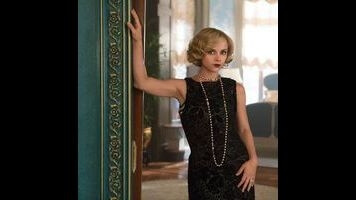F. Scott and Zelda Fitzgerald were such an iconic duo—the first pop-culture power couple, defining the jazz age, flapper culture, and the entire “lost” generation—it’s surprising that there haven’t been more movies made about them. But other than cinematic adaptations of Fitzgerald’s own—granted—autobiographical novels, depictions of Scott and Zelda are few and far between, like a 1993 TV movie starring Timothy Hutton and Natasha Richardson, which mostly focused on Zelda’s mental breakdown. Or a late-in-life Scott and Zelda played by Jeremy Irons and Sissy Spacek in Showtime’s 2002 film Fitzgerald. But the definitive cinematic look at the Fitzgeralds’ lives remained unexplored.
So there’s a lot to draw from here, and Z does a fine job of stretching the Fitzgeralds’ early life into a series of half-hours. We see Zelda’s status as the reigning Southern belle of Montgomery, Alabama, and Scott’s brief career as a soldier. We see the parties we’ve heard so much about at the Biltmore, dotted with names like Zelda’s childhood friend Tallulah Bankhead and her sister Eugenia, or poet Edna St. Vincent Millay. We see frustrated paternal editor Max Perkins trying to coax another best-seller out of his star writer. All of this is depicted against a truly astonishing backdrop; Z’s production quality is cinematic, as somehow Model Ts line the streets of an overwhelming 1920s Manhattan landscape. And look for Zelda’s glittery flapper frocks to snag some nominations next award season (and hopefully some Tom & Lorenzo write-ups).
Still, this series’ main advantage is a previously unexplored feminist take on what Zelda’s life must have been like. Her sister offers her some sex advice for her wedding night: Just lie back and let her husband “take the lead,” while musing about magnolia trees. Zelda was an artist: a dancer, a writer, and a painter in her own right, and here we get a view of the Fitzgeralds’ life that depicts just how much Scott siphoned away Zelda’s creative energy, raiding her diary for inspiration. Scott is almost villainous from this angle, and so well-played by David Hoflin it’s as if he walked right out of a 1922 photograph. Scott was notoriously frequently drunk, as well as envious of the upper-crust life he wasn’t born into but, Gatsby-like, always strived for. Here we see his petulant tantrums against literary critics, Princeton, Zelda’s parents: anyone who refuses to get on board with his efforts to be the greatest writer of the 20th century. His dialogue, especially in the earlier episodes, is a bit ham-fisted, constantly telling everyone, “I’m gonna be a famous writer some day” or replying to Judge Sayre’s query if he’s going to be the next Mark Twain: “I’m going to be the next F. Scott Fitzgerald.” While unfailingly awkward, these lines could also be real quotes, from what we know about Scott and his desperate drive to succeed.
Ricci doesn’t straight-up inhabit the role of Zelda physically as well as Hoflin does Scott: She’s a bit short, for one thing, and Hemingway described Zelda as having “hawk eyes,” while Ricci’s are luminous. But emotionally, her Zelda practically shimmers. She sees her matronly sisters and doesn’t want to get ensnared in that lifestyle: Scott Fitzgerald offers her a glittering life of new dresses and unlimited champagne. She soon finds out that that life also includes frequent hangovers and a massive pile of debt. The couple was notably volatile, so their fights—soon after they’re married, Zelda sneeringly tells Scott that one of his critics is absolutely right to call him a fraud—also have a ring of truth. And it’s fun to see their legendary dancing-in-a-fountain escapades finally play out on screen.
But as Zelda’s diary gets pirated by Scott to become his source material rather than her own, we can’t help but wonder what Zelda Fitzgerald could have accomplished in a different age. After all, she was surrounded by women like Bankhead and Millay—as well as Dorothy Parker and Gertrude Stein—who were crafting out their own careers without a man in sight, even in the 1920s. But those women were not in love with Scott Fitzgerald, and Zelda’s many sacrifices for the man she loves color each episode. Of course, we know that none of this ends happily: Those gin bottles that Fitzgerald so gleefully chugs would wind up killing him at age 44; eight years later, a mentally ill Zelda would die in a sanitarium fire. We only see a few glimpses of her future illness in this first Amazon season, and maybe that’s what’s so astounding: By the end of these 10 episodes, the Fitzgeralds haven’t even hit Paris yet. There’s still so much of their story to be told.
But for Fitzgerald fans, wannabe Fitzgerald fans, or even people who can appreciate a well-done period drama, Z has a lot to offer, even as it gives us lots to think about. At one point, Zelda and Scott race away in a Model T, and in their haste hit an animal on the road. Zelda cries, but Scott insists they leave before even putting the animal out of its misery. It’s a short but effective analogy of the lives of the Fitzgeralds: All those mindless careening escapades were bound to have painful ramifications eventually.

